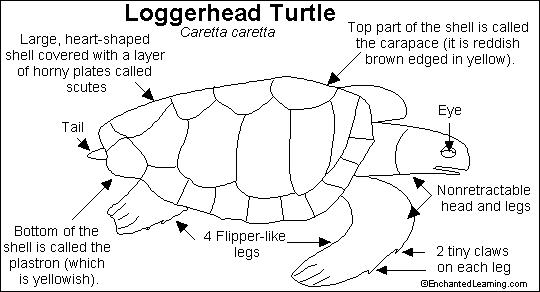
 |
| You might also like: | Manta Ray | Manta Ray | Green Things: Printable Color Book | Turtle and Tortoise Printouts | Animal Coloring pages: Se | Today's featured page: Pine Cone Bird Feeder |
| Turtle and Tortoise Printouts | EnchantedLearning.com Sea Turtles | Animal Printouts Label Me! Printouts |


Anatomy: These cold-blooded animals are strong swimmers and good divers. They have four flipper-like legs and a shell that is attached to their backbone. They cannot pull their head and legs into the shell. These turtles vary in color from shades of brown to green to black. Sea turtles vary in size from 2 to 6 feet (0.5 to 1.9 m) long, weighing 78 to 1900 pounds (35 to 870 kg). During active times, turtles must go to the sea's surface every few minutes in order to breathe air.
Diet: Most sea turtles are carnivores (meat eaters), but the green turtle is an herbovore (a plant eater that eats sea grass and algae). Most sea turtles eat crustaceans (crabs, lobster, shrimp, and other shelled invertebrates), shellfish, jellyfish, Man-of-War, and small fish.
Reproduction: Adult female Sea Turtles return to the beach where they were born to lay up to 200 soft-shelled eggs in the sand. When the baby turtles hatch, they immediately head for the nearby water. Many young turtles are eaten by birds and other predators during this difficult trip. It has been estimated that only 1% of these hatchlings will reach adulthood. No one knows how the females find the beach where they were born.
| Search the Enchanted Learning website for: |